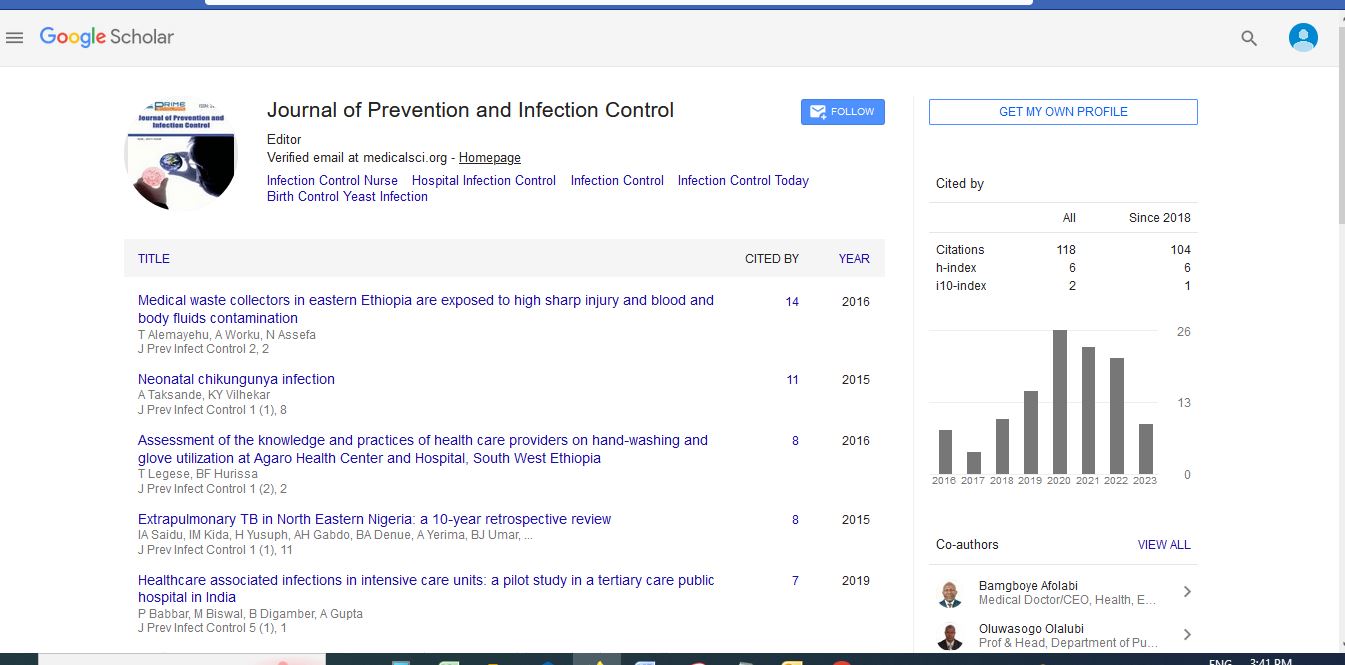Short Communication - (2023) Volume 9, Issue 3
Klebsiella: An Emerging Threat in Healthcare
Freud Carl*
Department of Science, University of California, USA
*Correspondence:
Freud Carl,
Department of Science, University of California,
USA,
Email:
Received: 30-Aug-2023, Manuscript No. IPJPIC-23-17937;
Editor assigned: 01-Sep-2023, Pre QC No. IPJPIC-23-17937 (PQ);
Reviewed: 15-Sep-2023, QC No. IPJPIC-23-17937;
Revised: 20-Sep-2023, Manuscript No. IPJPIC-23-17937 (R);
Published:
27-Sep-2023, DOI: 10.36648/2471-9668-9.3.27
Introduction
Klebsiella, a genus of gram-negative bacteria, has gained prominence
as a healthcare-associated pathogen due to its ability to
develop antibiotic resistance and cause a range of infections. This
research article provides an in-depth review of Klebsiella, covering
its historical context, taxonomy, virulence factors, antibiotic
resistance mechanisms, clinical manifestations, epidemiology,
diagnostic methods, treatment options, and current research developments.
The increasing threat posed by multidrug-resistant
Klebsiella strains necessitates a comprehensive understanding of
this pathogen and concerted efforts to combat its spread. Klebsiella
species are among the most common gram-negative bacteria
associated with healthcare-acquired infections. Their capacity
to develop antibiotic resistance and their role in a variety
of infections, including pneumonia and urinary tract infections,
have made Klebsiella a significant focus of research and public
health concern. Understanding the historical context of Klebsiella
is essential to appreciate its evolution as a healthcare-associated
pathogen. Klebsiella species were initially identified as part
of the normal human microbiota but have since emerged as important
opportunistic pathogens. Klebsiella is a genus within the
family encompassing several species with varying virulence factors
and antibiotic resistance profiles. The taxonomic classification
of Klebsiella and its subspecies is a dynamic area of research.
Klebsiella strains possess numerous virulence factors that enable
them to cause infections.
Description
These factors include capsule polysaccharides, lipopolysaccharides,
fimbriae, and various enzymes that contribute to their
pathogenicity. One of the most alarming aspects of Klebsiella infections
is their capacity to develop antibiotic resistance. Klebsiella
pneumoniae, in particular, is associated with the emergence
of carbapenem-resistant strains, often harboring extended-spectrum.
Klebsiella can cause a wide range of infections, including
urinary tract infections, pneumonia, bloodstream infections, and
wound infections. The clinical presentation varies depending on
the site of infection and the virulence of the strain involved. Klebsiella
infections are a significant concern in healthcare settings,
particularly in intensive care units. The ability of these bacteria
to persist in the hospital environment and their propensity for
healthcare-associated outbreaks pose unique challenges for infection
control. Accurate and timely diagnosis of Klebsiella infections
is essential for appropriate patient management and
infection control. Diagnostic methods include culture and susceptibility
testing, molecular methods, and matrix-assisted laser
desorption/ionization time-of-flight mass spectrometry. The
management of Klebsiella infections is complicated by the rising
prevalence of antibiotic resistance. Empirical treatment often involves
broad-spectrum antibiotics, but targeted therapy should
be guided by susceptibility testing. Combination therapy and alternative
treatment options are sometimes necessary in the face
of multidrug-resistant strains. Ongoing research on Klebsiella focuses
on understanding the molecular mechanisms of antibiotic
resistance, developing new treatment strategies, and improving
infection control measures. Strategies to combat carbapenem-
resistant Klebsiella and other multidrug-resistant pathogens
are of paramount importance [1-4].
Conclusion
Klebsiella is an emerging threat in healthcare, with its multidrug-
resistant strains posing a considerable challenge to infection
control and patient care. A comprehensive understanding
of the taxonomy, virulence factors, antibiotic resistance mechanisms,
clinical manifestations, and epidemiology of Klebsiella
infections is vital for addressing this public health concern. As
research continues to elucidate the complexities of Klebsiella
infections, the development of effective prevention, treatment,
and control strategies remains essential to combat this formidable
pathogen and safeguard patient health in healthcare settings.
Acknowledgement
None.
Conflict Of Interest
None.
References
- Gordts B, Gordts B (2005) Models for the organisation of hospital infection control and prevention programmes. Clin Microbiol Infect 1: 19-23.
[Crossref] [Google Scholar]
- Min Q, Yang J, Gong X (2021) The use of a three-in-one practice-management-Innovation training model in the construction of an infection control team. Risk Manag Healthc Policy 14: 3403-3409.
[Crossref] [Google Scholar]
- Croxson B, Allen P, Roberts JA (2003) The funding and organization of infection control in NHS hospital trusts: A study of infection control professionals' views. Health Serv Manage Res 16(2): 71-84.
[Crossref] [Google Scholar]
- Cookson B, Drasar B, Cookson B (2006) Diploma in hospital infection control-important changes to the accreditation of prior experiental learning and update. J Hosp Infect 62(4): 507-10.
[Crossref] [Google Scholar
Citation: Carl F (2023) Klebsiella: An Emerging Threat in Healthcare. J Prevent Infect Control. 9:27.
Copyright: © 2023 Carl F. This is an open-access article distributed under the terms of the Creative Commons Attribution License,
which permits unrestricted use, distribution, and reproduction in any medium, provided the original author and source are
credited.

